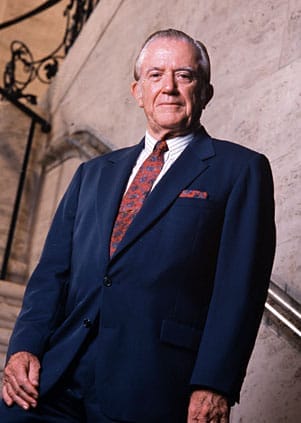 Ed Pratt expanded pharmaceutical company Pfizer operations into almost every country of the world during the 1970s, increasing revenue sevenfold, from $1 billion to nearly $7 billion by focusing on social responsibility, technology, world trade, and corporate creativity.
Ed Pratt expanded pharmaceutical company Pfizer operations into almost every country of the world during the 1970s, increasing revenue sevenfold, from $1 billion to nearly $7 billion by focusing on social responsibility, technology, world trade, and corporate creativity.
Born in 1927 Savannah, GA, Pratt served in the U.S. Navy, then spent nine years with International Business Machines Corp. (IBM). Pratt signed on with the Kennedy administration as Assistant Secretary of the Army. After managing the Army’s finances, Pratt joined Pfizer as controller in 1964 with an impressive understanding of international trade dynamics. In 1969 Pratt became chairman and president of Pfizer International; by 1971 he was elected president and in 1972 rose to CEO and chairman.
He focused on establishing research and development facilities worldwide, as well as the acquisition of medical-device companies and developing breakthrough products such as Procardia XL for angina and high blood pressure. The company’s revenues soared, accentuated by his conservative financial management and focus on creativity. “I told my colleagues that if we were creative, had fun, and worked hard, we could be among the best of the best,” he said.
He also led Pfizer to be a positive force in the community. In the 1970s, for example, during the darkest days of New York City urban decay, Pratt took a historic leadership position to ally Pfizer with the city, other agencies, and corporations to fight back. Instead of abandoning a manufacturing facility in the Williamsburg section of Brooklyn, as many other companies did, Pratt committed to improving the neighborhood around the company’s plant. He created low-income housing and donated a Pfizer building for a public charter school, among other supports. As chairman of the President’s appointed Advisory Committee for Trade Negotiations, he broadened the trade agenda to include items of global impact, including the issue of intellectual property. As a chairman of the Business Roundtable, he was a top voice for U.S. corporations. He died in 2002.


























